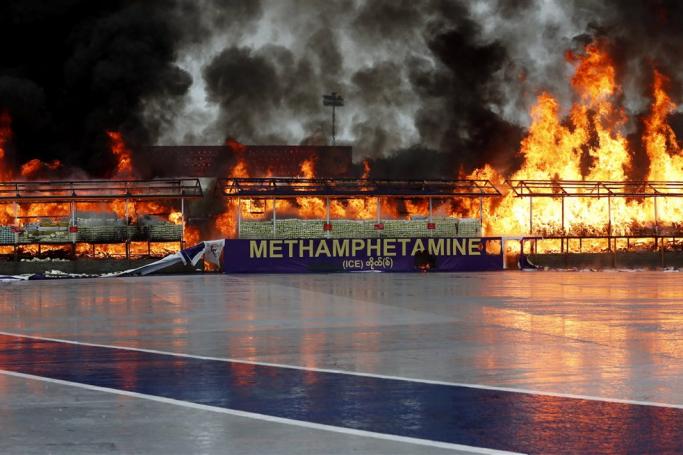Dotted across the length and breadth of Myanmar are drug addicts caught up in a criminal cycle with little or no help from the authorities.
There is irony in the Myanmar junta’s message this year on the United Nations International Day Against Drug Abuse and Illicit Trafficking last week on 26 June.
The theme? “People first: stop stigma and discrimination, strengthen prevention,” a line the junta parroted, along with ceremonies to burn large piles of seized illegal narcotics – everything from methamphetamines to Ketamin, opium and heroin.
Not only is the junta – illegally installed following the coup in February 2021 – failing to help addicts and put people first, but many junta officials – including military and police – are up to their eyeballs in the illicit trade themselves. According to analysts, the level of involvement by men in uniform picked up during the decade of the democracy experiment – but has kicked in to overdrive amidst the chaos post-coup.
The dire circumstances are not just bad for the lives of addicts and people negatively affected in the Golden Land. Meth tablets and refined heroin made in makeshift factories in a number of ethnic areas – primarily Shan and Kachin states - make their way onto the streets of countries in Southeast Asia, Australian and New Zealand and even further afield.
PUFF OF SMOKE
As piles of seized drugs went up in flames last week, the big lie is the Myanmar junta – in communication with international anti-narcotics organizations including the UNDP – is making efforts to stem the trade. But the reality is the Golden Triangle made up of Myanmar, Laos and Thailand continues to be a profitable hub for illegal drug cartels. And it is people who suffer.
The junta claimed they torched almost half a billion dollars-worth of illegal drugs on the day.
The seizures could be said to be evidence of some success. But, as a junta official made clear, they were failing to stop a surge in the production and trafficking of narcotics.
Head-high piles of heroin, cannabis, methamphetamine and opium were burned in the commercial hub Yangon, and televised torchings also took place elsewhere in the country, with a total of $446 million of narcotics going up in smoke, according to junta officials.
How serious is the anti-drug drive? Efforts are being made but, in a rare admission, the head of Myanmar's Central Committee for Drug Abuse Control said its efforts to crush the multi-billion-dollar trade were having no impact.
"Even though countless drug abusers, producers, traffickers and cartels were arrested and prosecuted, the production and trafficking of drugs have not declined at all," Soe Htut told the Global New Light of Myanmar newspaper.
‘NOT SERIOUS’
While the Myanmar junta puts on a façade of control and normality, the truth is the generals are fighting to maintain their position – including quietly maintaining sources of income from a range of illegal or damaging activities including the drug trade, logging, mining and human trafficking, including the activities of online scamming.
Analysts say the military, whose image has been seriously blackened in the wake of the coup, is not serious about ending the lucrative trade. The army is "actually the ultimate protection cartel of the trade, and have been for many years", independent analyst David Mathieson told AFP.
The burning comes as the United Nations reported record seizures of crystal meth last year in Myanmar and said opium poppy farming had seen a revival in the chaos unleashed by the coup.
More than 23 tons of crystal meth were seized in Myanmar in 2022, the UN's Office on Drugs and Crime said earlier this month.
Wholesale and street prices for meth across Southeast Asia were falling or at record lows, it said.
"The most powerful regional trafficking networks are able to operate with a high degree of certainty they can and will not be stopped," it said.
Opium poppy production in Myanmar also ramped up dramatically following the coup, the office said in January, as political and economic turmoil drove farmers to cultivate the crop. The area of land used for opium poppy is now at just over 40,000 hectares, the UN said - around half the size of New York City.
Authorities in neighbouring Thailand said they destroyed 32 tonnes of illicit drugs, mostly meth, with a value of around $607 million.
Myanmar has seen a ratcheting up of access to drugs since the coup, with police more interested in extortion than real narcotics suppression. Police appear to be slack in the cities where drugs are openly available to youth at karaoke bars, with ketamine the drug of choice.
ADDICTS FORGOTTEN
While military, police and junta administration officials benefit from the efforts of the drug cartels with their factories and refining facilities, hundreds of thousands of people, primarily youth, in the Southeast Asian region and further afield, are negatively affected by the availability and generally cheap price of a range of drugs that are typically consumed in a range of ways, from ingestion to smoking to injection.
For Myanmar youth, the drug scourge compounds the economic and social problems that have beset the country in the wake of the coup. It can be a vicious cycle. Limited or no job opportunities can lead to increased drug use – and the temptation to become a drug pusher, supporting their addiction and providing income during dire times.
Even when there was some form of stability in Myanmar – during the decade-long democratic window – the lure of drugs sucked the youth in. Today, post-coup, drug addicts face a bleak future.
Additional reporting by AFP.












